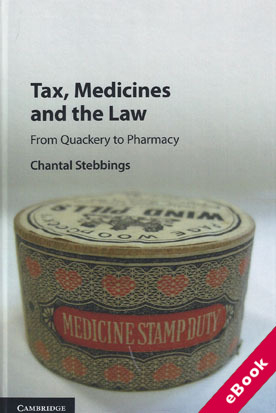We are now closed for the Christmas and New Year period, returning on Monday 5th January 2026. Orders placed during this time will be processed upon our return on 5th January.

The device(s) you use to access the eBook content must be authorized with an Adobe ID before you download the product otherwise it will fail to register correctly.
For further information see https://www.wildy.com/ebook-formats
Once the order is confirmed an automated e-mail will be sent to you to allow you to download the eBook.
All eBooks are supplied firm sale and cannot be returned. If you believe there is a fault with your eBook then contact us on ebooks@wildy.com and we will help in resolving the issue. This does not affect your statutory rights.
In 1783 a stamp duty was imposed on proprietary or 'quack' medicines. These largely useless but often dangerous remedies were immensely popular.
The tax, which lasted till 1941, was imposed to raise revenue. It failed in its incidental regulatory purpose, had a negative effect in that the stamp was perceived as a guarantee of quality, and a positive effect in encouraging disclosure of the formula.
It promoted the pharmacy profession by recognising chemists and druggists as an occupational group and provoking their unity in opposition, but undermined it by reinforcing their trading character. The legislation imposing the tax was complex, ambiguous and never reformed.
The tax authorities had to administer it, and executive practice came to dominate it. A minor, specialised, low-yield tax is shown to be of real significance in the pharmaceutical context, and of exceptional importance as a model revealing the wider impact of tax law and administration.